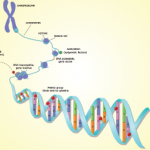Zhijian “James” Chen, PhD, Receives Lupus Research Institute Distinguished Innovator Award

Zhijian “James” Chen, PhD, a professor at the University of Texas, Southwestern Medical Center, Dallas, is a recipient of the Lupus Research Institute (LRI) 2014 Distinguished Innovator Award to support major studies that can advance the search for prevention, treatment and a cure.
Dr. Chen has discovered an essential new process that alerts the immune system to viruses by sensing the presence of foreign DNA within cells. When cells die, but don’t clear and aren’t properly disposed of by the body, DNA ends up in the cytoplasm, where it is seen as foreign DNA.
Dr. Chen’s research team identified a sensor of innate immunity called cGAS (the enzyme cyclic GMP-AMP synthase) that, after detecting and binding to the DNA it sees as a threat, catalyzed a compound called cGAMP (cyclic GMP-AMP). The cGAMP, which had never been seen in humans before, binds to an adaptor protein called STING. A cell-signaling cascade then produces interferons and cytokines: agents of inflammation.
“Normally this pathway is important for immune defense against infections by microbial pathogens. However, when the immune system turns against host DNA, it can cause autoimmune diseases,” Dr. Chen says. “Our discovery of cGAS as the DNA sensor provides an attractive target for the development of new drugs that might treat autoimmune diseases.”
John J. O’Shea, MD, Elected to the Institute of Medicine

John J. O’Shea, MD, scientific director of the NIH’s National Institute of Arthritis and Musculoskeletal and Skin Diseases (NIAMS), has been elected to membership in the Institute of Medicine (IOM) of the National Academy of Sciences.
Dr. O’Shea has been a physician and immunologist at NIH for 33 years, where he has made fundamental discoveries related to the signaling of cytokines, molecules critical to the development and functioning of the immune system. His discovery of Janus kinase 3 (Jak3) led to Pfizer developing tofacitinib, the first FDA-approved kinase inhibitor in rheumatic diseases therapy.
“It is a great honor to be recognized by your peers. It is one of the highest honors,” says Dr. O’Shea.
“John is a remarkable example of a clinician-scientist who has advanced the field of immunology by translating his discoveries into approaches that improve human health,” says NIAMS Director Stephen I. Katz, MD, PhD. “These discoveries are likely to benefit patients for years to come.”
Dr. O’Shea says one of the goals of the Institute of Medicine is “to advise the nation regarding healthcare by providing [medical] recommendations to the American people.”
This is Dr. O’Shea’s second appearance in Movers & Shakers this year. He was profiled in July 2014 after he received the 2014 Ross Prize in Molecular Medicine.
Vivian Bykerk, MD, Conducting AMP RA/Lupus Network Research

Vivian Bykerk, MD, an associate attending rheumatologist at New York’s Hospital for Special Surgery (HSS), is one of the researchers involved in the Accelerating Medicines Partnership (AMP) in Rheumatoid Arthritis and Lupus Network. Through the AMP, the researchers will work to define the biology behind rheumatoid arthritis and lupus.
This huge collaborative effort to share data and tissue samples includes 11 research groups across the country. The groups will “study and leverage new technologies to identify pathways and markers,” according to Dr. Bykerk.
Her team at HSS will provide tissue and blood samples from rheumatoid arthritis patients having joint replacement. Those samples will be studied at various sites using different technologies. “It’s the beginning of Big Data medicine,” says Dr. Bykerk. “The various sites will use a systems biology approach to analyze and see patterns.”
She says, “While looking at clinical characteristics and outcomes, the researchers will also start to look at single cells, gene expressions and epicenters.”
The initial tasks will be determining how all the sites will work together. Should they look at fresh or frozen samples? Do they want to use blood or tissue samples? How do the novel, promising technologies link to what happens with patients?
“Skeptics question whether it can work. Supporters believe it’s the only way to go,” says Dr. Bykerk.
James O’Dell, MD, Receives Lee C. Howley Sr. Prize for Research in Arthritis

The 2014 Lee C. Howley Sr. Prize for Research in Arthritis was awarded to James O’Dell, MD, for what the national Arthritis Foundation deems the year’s most important scientific paper that will lead to a faster cure for arthritis and related diseases. “Therapies for Active Rheumatoid Arthritis after Methotrexate Failure” appeared in the July 25, 2013, issue of The New England Journal of Medicine.
Dr. O’Dell’s paper described “a study [that] compared the effectiveness of drug therapies for rheumatoid arthritis and found that the use of a less expensive combination of disease-modifying antirheumatic drugs (DMARDs) produced the same clinical benefits as much more expensive biological treatment,” according to the Arthritis Foundation award announcement.
The study was a 48-week, double-blind, noninferiority trial with randomly assigned 353 participants, who had active rheumatoid arthritis despite methotrexate therapy, to a triple regimen of DMARDs (methotrexate, sulfasalazine and hydroxychloroquine) or etanercept plus methotrexate.
Comparing the triad of DMARDs to the biologic therapy, the study demonstrated “similar clinical and radiologic results,” says Dr. O’Dell. In addition, he says the use of DMARDs could “save a half million dollars over a patient’s life time.”
Dr. O’Dell is chief of the University of Nebraska Medical Center Division of Rheumatology and Immunology and chief of rheumatology at the Omaha (Neb.) VA Medical Center.
Ann-Marie Lindstrom is an independent writer and editor based in the Tucson, Ariz., area.



